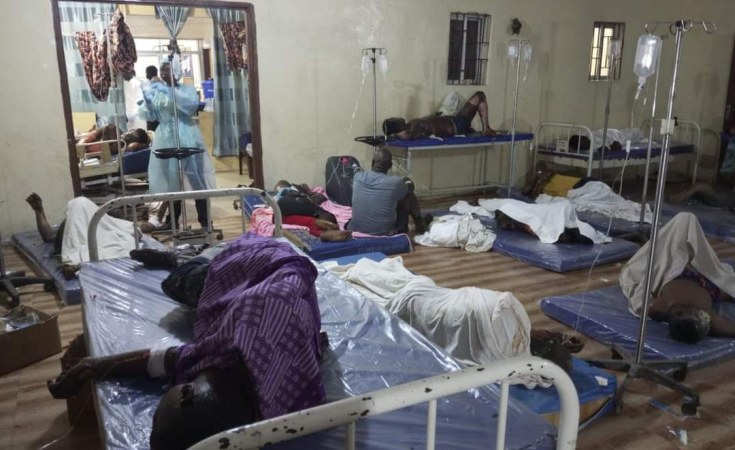A FUEL TANKER explosion that killed more than 60 people last week in the central Liberian town of Totota, lower Bong County, has raised renewed questions over disaster preparedness Liberia and the urgent lessons that need to be learnt.
THE DECEMBER 26 explosion followed a road accident in a populated city, and the resultant fireball destroyed a mini tea shop that was in proximity to the scene of the incident - depriving the owner people of his livelihood. It was one of the worst ever explosions in the country. It is far from the first large-scale urban disaster to befall Liberia in recent years: On September 18 2019, at least 27 people died, many of whom were children at a boarding school in a suburb of the capital, Monrovia.
THE FIRE WAS believed to have broken out in the early hours of the morning, when Koranic school students were sleeping in a building near a mosque. They were buried in the same mass cemetery as last week's tanker blast victims.
PRESIDENT GEORGE WEAH has promised to set up a task force to investigate the latest tragedy and to make recommendations for much-needed change. The following provides an insight into how the explosion has exposed the gaps in Liberia's disaster readiness.
LAST WEEK'S TANKER blastpoints to how people's risk perception - and needs - can exacerbate vulnerability. Rather than treating the fuel gushing from the damaged tanker prior to the explosion as a hazard, Totota's residents tried to collect it as a windfall, underlining how poverty can drive dangerous behavior.
MITIGATING THAT RISK calls for urgent and sustained public education on technological hazards of this nature, and on what should be the appropriate response in such circumstances.
THE VOLUME OF CASUALTIES seeking treatment - more than 100 severely burned victims - exposed a critical weakness in the preparedness of medical services.
PHEBE, THE ONLY referral hospital in central Liberia, was overwhelmed with the influx of injured people from the fire disaster. Scarce medical supplies and limited bed capacity prompted the intervention of ordinary citizens and politicians - but there were delays in the time-sensitive treatment required by severe burned victims.
THERE WAS A critical time lag of about two hours between the time when the accident occurred and the subsequent explosion. The scale of the disaster could have been minimized if a nearby police post had acted swiftly to cordon off the accident scene, divert traffic, and liaise with the fire service to deal with the highly flammable fuel discharge.
ROAD ACCIDENTS are one of the main urban risks people face in Liberia. Despite this, vehicle road safety testing is a rarity in the country, and the roadworthiness of large trucks in particular is questionable.
EXISTING REGULATORY frameworks need to be revamped, and road safety is one glaring area. Road traffic deaths on the Monrovia-Ganta highway have become one of the highest in the country in recent years.
THE FULL EXTENT of the tragedy is not just the statistics on fatalities and injuries. The bulk of those losses are linked to income-generation activities and will have a lasting impact on the economic fabric of the area.
TALK OF "RECOVERY" should therefore be long-term and holistic, encompassing healthcare but also livelihood and social support for survivors and the dependents of the victims.
THERE IS SIGNIFICANT scope to improve emergency response mechanisms, including how disaster information is shared and acted upon.
THIS WILL BE A TEST case for the National Disaster Agency of Liberia as it aims to decentralize disaster risk reduction efforts, improve early warning and risk communication systems, and build institutional capacity.
THE GAPS in the National Disaster's capacity - both human and infrastructural - must be critically assessed. The same goes for its support institutions, which include the security forces - key first responders in such emergencies.
THE PERFORMANCE of the Fire Service Agency also needs to be reviewed. For instance, previous major blazes in Liberia have highlighted how equipment limitations can hinder the speed of the response.
THIS TRAGEDY IS a wake-up call to ensure that disaster risk management budgets are protected, accessible, and deployed efficiently throughout the country to fill capacity and infrastructure deficits.
GREATER RECOGNITION should be given to the resourcefulness of community-based organizations and to their awareness-raising capabilities. These groups exist even in informal settlements, and they can be drafted in to help with the design and delivery of appropriate risk messaging.


